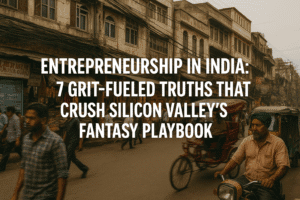Entrepreneurship in India: 7 Grit-Fueled Truths That Crush Silicon Valley’s Fantasy Playbook
India’s entrepreneurs operate with a grit-fueled resilience that sharply contrasts Silicon Valley’s high-speed, high-risk model. Rather than chasing unicorns and stock options, they prioritize tangible profits and immediate rewards, reflecting the reality of scarce capital and limited liquidity. With borrowing costs near double those in the U.S., Indian founders focus on sustainable, hyper-local dominance over rapid global scaling. Deep-rooted community networks fill gaps left by formal institutions, turning social trust into valuable business infrastructure. Constraints and challenges inspire practical innovation—like kirana stores using WhatsApp for inventory—showcasing frugal, effective solutions.
Profitability and survival take precedence over hype and valuations, allowing startups to build longer-term durability. India’s entrepreneurial approach offers a powerful blueprint for thriving amid instability, emphasizing action, trust, and adaptability. Ultimately, this survival-driven model proves that endurance and real-world problem-solving are the true measures of scalable success.

Entrepreneurship in India: 7 Grit-Fueled Truths That Crush Silicon Valley’s Fantasy Playbook
While Silicon Valley obsesses over unicorns and IPOs, India’s entrepreneurs are mastering a different art: building businesses that breathe through monsoons and droughts. Saurabh Mukherjea’s stark comparison—”Silicon Valley rules don’t apply in Chandni Chowk”—isn’t just about geography. It’s about two fundamentally distinct philosophies of risk, reward, and resilience.
The ESOP Illusion: When Equity Isn’t King
In the U.S., stock options are a golden handcuff. In India? Most of the 1.4 million tax-registered companies don’t offer ESOPs. But this isn’t a “lag”—it’s a rational response to reality.
- Why bonuses trump equity: With thin public markets and high capital costs (12%+ vs. 6% in the U.S.), liquidating shares is often impossible. Profit-linked bonuses are immediate, tangible rewards in an illiquid economy.
- The trust factor: When family savings fund 80% of startups (per IFC data), sharing ownership dilutes more than equity—it risks kinship capital.
Capital Isn’t Cheap, So Grit Is Currency
American founders “blitzscale.” Indian founders outlast.
- The 12% hurdle: Borrowing costs force surgical precision. A Mumbai vada pav stall turning ₹8 lakh/month isn’t scaling globally—it’s dominating a 500-meter radius with ruthless efficiency.
- Community as infrastructure: Where VC networks fail, bhai-chaara (brotherhood) fills gaps. Need a loan? Uncles pool funds. Regulatory tangles? Cousins know clerks. This isn’t inefficiency—it’s embedded social leverage.
Survivalism as Strategy
Marcellus’ “Ten Commandments” for Indian entrepreneurs reveal a counterintuitive truth: Constraints breed innovation.
“Think 10-year milestones, not 10X valuations. Build trust before tech. Bet on durability over disruption.”
Consider the Hyderabad kirana store using WhatsApp for inventory: No app funding, no AI—just frugal adaptation. Or the Mumbai auto-driver solving visa queues: He spotted a pain point VCs would ignore because his survival depended on noticing it.
The Hidden Advantage: Resilience Economics
While the U.S. registered 30X more startups since 2012, India’s growth rate kept pace—despite fragmented logistics, power cuts, and regulatory labyrinths. Why?
- Lower burn, longer runways: A ₹5 lakh ($6,000) startup can turn profitable in months. Failure isn’t catastrophic—it’s tuition.
- Profit > Hype: When capital is scarce, revenue isn’t vanity—it’s oxygen.
The Takeaway: Chandni Chowk’s Lessons for the World
India’s model offers a blueprint for building in instability:
- Reward action, not speculation: Bonuses tied to real profits align teams faster than lottery-ticket ESOPs.
- Leverage social capital: Trust networks reduce transaction costs no SaaS platform can match.
- Embrace the jugaad mindset: Innovation isn’t about moonshots—it’s about solving today’s crisis with today’s tools.
As Mukherjea notes, comparing Silicon Valley to Chandni Chowk is like “comparing a Ferrari to a bullock cart.” But in monsoon-flooded streets? One gets you home. India’s entrepreneurs aren’t playing a different game—they’re proving survival is the ultimate scalability.
You must be logged in to post a comment.